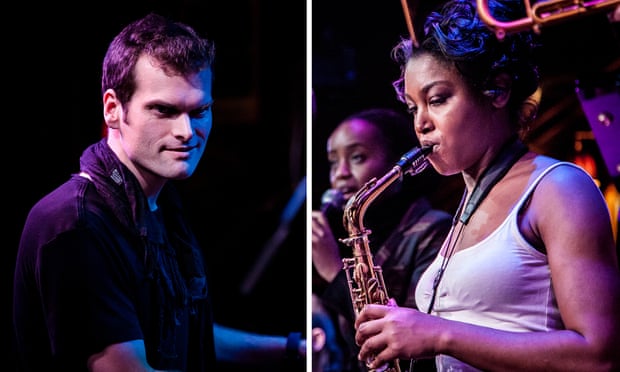Camilla George/ Andrew McCormack review – the funk and thunder of young British jazz
Heartwarming … pianist Andrew McCormack and sax player Camilla George at Ronnie Scott’s on 7 February. Photograph: Carl Hyde
John Fordham
Fri 9 Feb 2018 18.04 GMT
This rousing double bill at Ronnie Scott’s, featuring the young Nigeria-born saxophonist Camilla George and the British pianist/composer Andrew McCormack, was ostensibly a showcase for two of the brightest talents on the books of the enterprising new UK jazz promoter Ubuntu. But the backstory was that of Tomorrow’s Warriors, the UK jazz-education organisation founded by Gary Crosby and Janine Irons in 1991.
That inspirational venture nurtured the now spiralling jazz careers of McCormack and George, as well as a raft of local heroes including Jason Yarde and Soweto Kinch before them. The Tomorrow’s Warriors vision of a jazz party anyone can join, regardless of background, culture, gender or education, and making music anyone can tune into, glowed all around this gig.
George’s regular band, including the ever-inventive pianist Sarah Tandy, was augmented by young Warriors alumni including guitarist Shirley Tetteh and the variously intimate and neo-soulfully searing vocalist Cherise Adams-Burnett. The leader’s bittersweet saxophone improv and songlike melodic turns curled around Adams-Burnett’s eloquence on a dark lullaby, and cut through the funky snap of a jazz makeover of Curtis Mayfield’s New World Order. The culminating soul-jazz feature, punctuated by Tandy’s crisp Fender Rhodes chords and Quentin Collins’s trumpet hooks, featured a vividly skimming guitar break from the intriguing Tetteh.
Andrew McCormack’s Graviton was a tighter and more heavy-hitting outfit, not least because its rhythm section was powered by Jacob Collier, bass guitar virtuoso Robin Mullarkey and wildly creative Phronesis drummer Anton Eger. But the band’s thundering groove-power was lyrically balanced by versatile singer Noemi Nuti’s gliding wordless anthems.
Meanwhile, the Graviton title theme segued gleaming piano ostinatos, swaying chants and explosive percussion, and the improv inventiveness of McCormack – a subtly muscular player who sometimes unleashes a precise intensity worthy of McCoy Tyner – while the boppish saxophonist Leo Richardson kept springing surprises. The evening had its generic lulls, and Graviton’s leanings toward machine-tight contemporary hooks sometimes made it a shade robotic to jazz ears, but it heartwarmingly confirmed the vibrant present and future of young British jazz.
read more at:https://www.theguardian.com/music/2018/feb/09/camilla-george-andrew-mccormack-review-ronnie-scotts-london


0 Comments:
Post a Comment